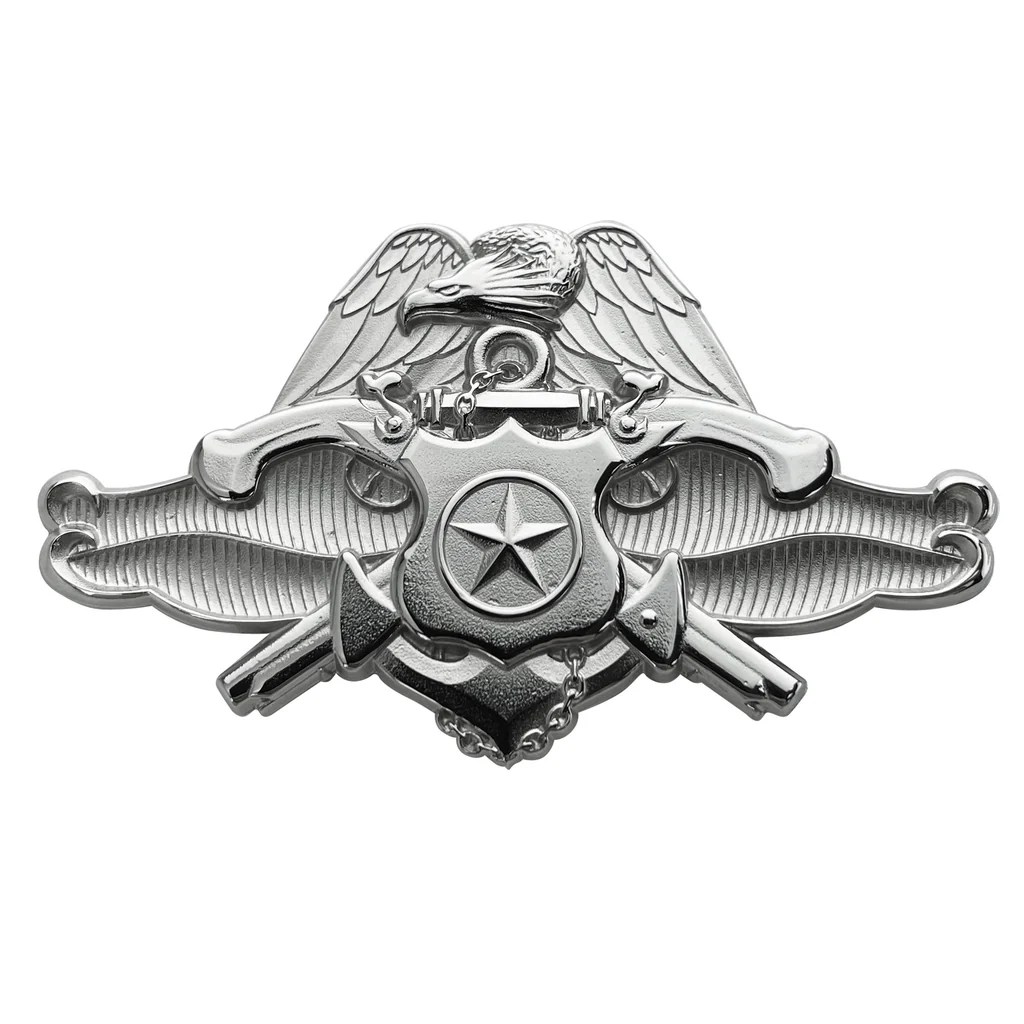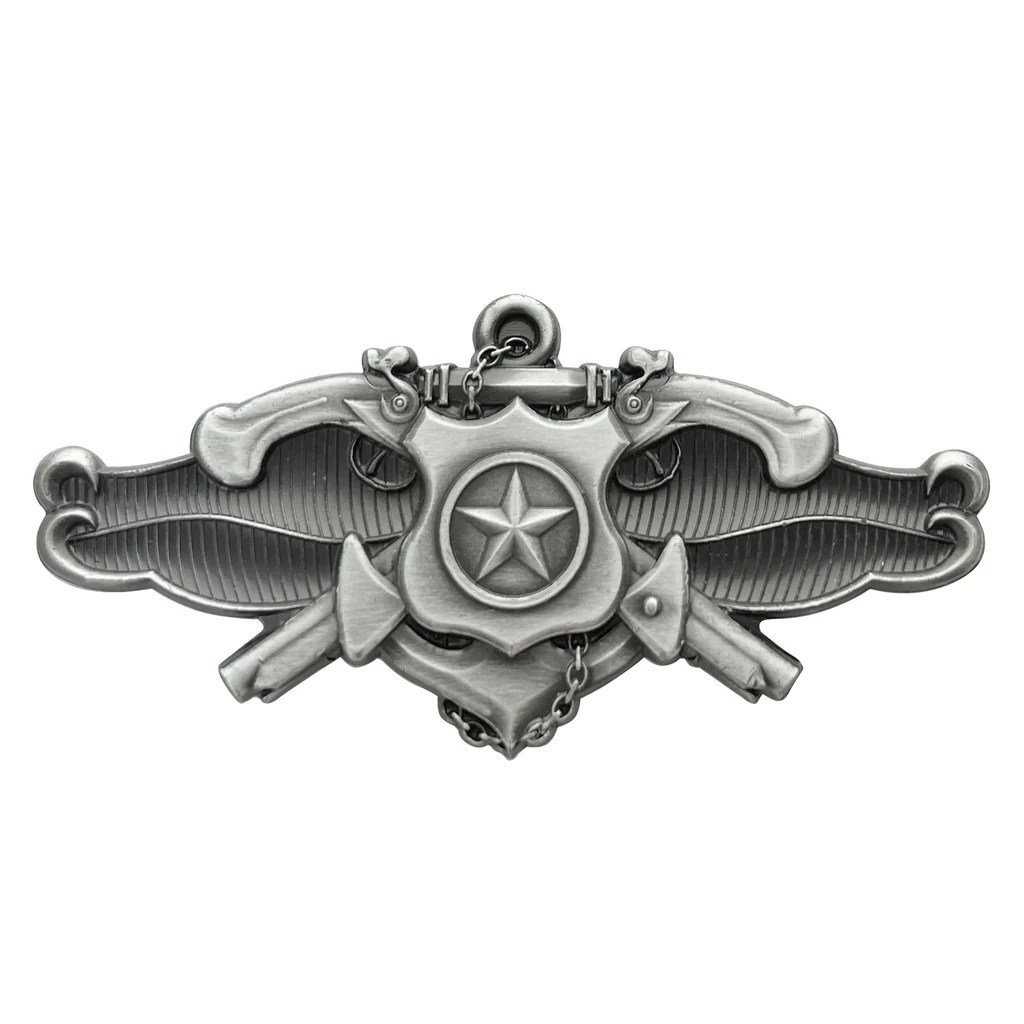The Navy Security Force Specialist Pin, a symbol of honor and distinction, is a testament to the dedication and professionalism of those who protect our nation’s naval assets. This coveted badge represents the specialized training and unwavering commitment of these elite security professionals.
The pin’s intricate design and rich symbolism evoke the essence of their mission: to safeguard our ships, bases, and personnel from threats and vulnerabilities, ensuring the smooth operation of naval operations worldwide.
Navy Security Force Specialist Pin Background

The Navy Security Force Specialist (NSF) pin is a symbol of honor and distinction awarded to Sailors who have successfully completed the rigorous NSF training program. It signifies the wearer’s proficiency in specialized security operations and their dedication to protecting the Navy and Marine Corps.
The pin’s design incorporates several elements that represent the NSF’s mission and values. The central feature is a shield, symbolizing protection and defense. The shield is emblazoned with an eagle, representing the United States Navy, and a trident, representing the Navy’s maritime mission.
The eagle and trident are crossed, symbolizing the NSF’s dual role as a maritime security force and a land-based security force.
Design Elements
The NSF pin is crafted from silver-tone metal and measures approximately 1 inch in diameter. It features a raised eagle and trident design with a polished finish. The shield is Artikeld in blue enamel, representing the Navy’s maritime heritage. The eagle’s wings are spread wide, symbolizing the NSF’s global reach and vigilance.
The trident’s three prongs represent the NSF’s ability to operate in all environments: sea, air, and land.
Eligibility and Requirements
The Navy Security Force Specialist pin is a prestigious award that recognizes the skills and dedication of Sailors who have successfully completed the rigorous Navy Security Force Specialist (NSFS) program. To be eligible for the NSFS pin, Sailors must meet the following criteria:
Navy Enlisted Classification (NEC) Code
- Hold a NEC code of 551X (Navy Security Force Specialist).
Training and Certification
In addition to meeting the eligibility criteria, Sailors must also complete the following training and certification requirements:
- Successfully complete the NSFS “A” School.
- Qualify on all required weapons systems.
- Pass the NSFS Physical Fitness Assessment (PFA).
- Obtain a Secret security clearance.
Upon successful completion of the NSFS program, Sailors are authorized to wear the NSFS pin as a symbol of their expertise and commitment to Navy security.
Roles and Responsibilities: Navy Security Force Specialist Pin
Navy Security Force Specialists are responsible for providing security and force protection within Navy installations, assets, and personnel.
Their primary roles include:
- Conducting physical security assessments and inspections
- Patrolling and securing Navy facilities
- Responding to security incidents and emergencies
- Enforcing military regulations and laws
They are also involved in:
- Anti-terrorism measures
- Force protection operations
- Law enforcement operations
Navy Security Force Specialists are highly trained and skilled professionals who play a vital role in protecting the Navy and its assets.
Force Protection
Navy Security Force Specialists are responsible for protecting Navy personnel, facilities, and assets from threats and attacks.
- They conduct physical security assessments and inspections to identify potential vulnerabilities.
- They patrol and secure Navy facilities, both ashore and afloat.
- They respond to security incidents and emergencies, such as bomb threats, active shooters, and natural disasters.
Anti-Terrorism
Navy Security Force Specialists are also involved in anti-terrorism measures.
- They conduct counter-terrorism training and exercises.
- They develop and implement anti-terrorism plans.
- They work with other agencies to identify and disrupt terrorist threats.
Law Enforcement
Navy Security Force Specialists are also responsible for enforcing military regulations and laws.
- They investigate crimes and apprehend suspects.
- They issue traffic tickets and enforce parking regulations.
- They conduct drug and alcohol tests.
Training and Education
Navy Security Force Specialists undergo specialized training programs that equip them with the skills and knowledge essential for their role in safeguarding Navy assets and personnel.
The training curriculum emphasizes weapons handling, tactics, and security protocols, ensuring that Specialists are proficient in using various weapons, employing effective tactics, and adhering to strict security measures.
Weapons Handling
- Extensive training in handling firearms, including pistols, rifles, shotguns, and machine guns.
- Marksmanship skills development through live-fire exercises and simulations.
- Weapon maintenance and troubleshooting procedures to ensure optimal functionality.
Tactics
- Instruction in defensive and offensive tactics for various scenarios, including hostage rescue, anti-terrorism, and crowd control.
- Development of situational awareness, decision-making skills, and teamwork.
- Familiarization with close-quarters combat techniques and non-lethal weapons.
Security Protocols
- In-depth understanding of Navy security regulations, policies, and procedures.
- Training in access control, surveillance, and incident response.
- Development of communication and reporting skills for effective coordination and information sharing.
Uniform and Insignia
The Navy Security Force Specialist uniform, distinctive in its design and insignia, serves as a symbol of authority and professionalism within the U.S. Navy. The uniform adheres to strict regulations, ensuring uniformity and fostering a sense of esprit de corps among its members.
Insignia, Navy security force specialist pin
The Navy Security Force Specialist insignia, proudly displayed on the uniform, holds significant meaning and represents the wearer’s specialized training and responsibilities. The crossed anchors, a universal symbol of the Navy, are emblazoned on a silver badge, signifying the specialist’s maritime heritage.
The eagle, clutching a trident in its talons, represents the readiness and vigilance of the security force, while the stars and stripes on the badge’s base pay homage to the United States of America.
Distinctive Markings
The Navy Security Force Specialist uniform features distinctive markings that distinguish its wearers from other Navy personnel. The beret, a symbol of elite military units, is worn in navy blue, adorned with the Navy Security Force Specialist badge. The badge, prominently displayed on the left breast pocket, identifies the individual as a member of the specialized force.
Additionally, the uniform incorporates a unique shoulder patch, featuring the Navy Security Force Specialist insignia, further reinforcing the wearer’s affiliation with the unit.
Career Advancement and Opportunities
Navy Security Force Specialists have a range of opportunities for career progression and advancement. They can progress through the enlisted ranks, from Seaman Recruit to Master Chief Petty Officer, and can also pursue specialized assignments and leadership roles.
- Promotions:Navy Security Force Specialists are eligible for promotion based on their performance, experience, and education. Promotions are competitive, and specialists must meet the requirements for each rank.
- Specialized Assignments:Navy Security Force Specialists can apply for specialized assignments, such as instructor, recruiter, or security advisor. These assignments provide opportunities for professional development and career growth.
- Leadership Roles:Navy Security Force Specialists can advance to leadership roles, such as squad leader, platoon sergeant, or company commander. These roles provide opportunities to develop leadership skills and manage teams of Sailors.
Impact on Naval Operations

Navy Security Force Specialists play a pivotal role in ensuring the security and effectiveness of naval operations. They are responsible for protecting ships, bases, and personnel from threats and vulnerabilities, enabling the Navy to carry out its missions safely and efficiently.
Role in Protecting Ships and Bases
Navy Security Force Specialists are deployed on ships and at naval bases worldwide. They conduct security patrols, enforce security regulations, and respond to security incidents. They are equipped with specialized weapons and equipment to deter and neutralize threats, ensuring the safety of naval assets and personnel.
Role in Counterterrorism and Force Protection
Navy Security Force Specialists are trained in counterterrorism tactics and force protection measures. They work closely with intelligence agencies and other security forces to identify and neutralize potential threats. They also provide security for high-value targets, such as senior military officials and visiting dignitaries.
Historical Significance
The Navy Security Force Specialist role emerged from the need to enhance the security of naval assets and personnel in the face of evolving threats. Historically, the role has undergone significant transformations, adapting to the changing security landscape and playing a pivotal role in safeguarding naval operations.
In the early 20th century, the primary focus of naval security was on protecting ships from sabotage and attacks. During World War II, the establishment of the Navy Shore Patrol and the creation of specialized security units marked a significant step in formalizing the role of Navy security personnel.
Notable Operations
Navy Security Force Specialists have played a crucial role in numerous notable operations, including:
- Operation Desert Storm (1991):Provided security for naval installations and personnel during the Gulf War.
- Operation Iraqi Freedom (2003):Protected naval assets and personnel in the Middle East during the Iraq War.
- Operation Enduring Freedom (2001):Conducted anti-terrorism operations and provided security in Afghanistan.
- Operation Odyssey Dawn (2011):Enforced a no-fly zone over Libya and provided security for naval operations.
Common Queries
What is the significance of the eagle on the Navy Security Force Specialist Pin?
The eagle symbolizes strength, courage, and vigilance, qualities essential to the role of a Navy Security Force Specialist.
What are the eligibility requirements for receiving the Navy Security Force Specialist Pin?
To be eligible, individuals must complete specialized training programs and meet strict physical and mental fitness standards.
What are the primary roles and responsibilities of Navy Security Force Specialists?
They are responsible for force protection, anti-terrorism, and law enforcement operations, ensuring the safety and security of naval assets and personnel.